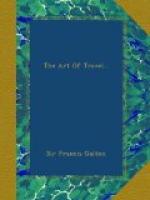Rockets.—Of all European inventions, nothing so impresses and terrifies savages as fireworks, especially rockets. I cannot account for the remarkable effect they produce, but in every land, it appears to be the same. A rocket, judiciously sent up, is very likely to frighten off an intended attack and save bloodshed. If a traveller is supplied with any of these, he should never make playthings of them, but keep them for great emergencies.
Natives forbidden to throng the Camp.—Have a standing rule that many natives should never be allowed to go inside your camp at the same time: for it is everywhere a common practice among them, to collect quietly in a friendly way, and at a signal to rise en masse and overpower their hosts. Even when they profess to have left their arms behind, do not be too confident: they are often deposited close at hand. Captain Sturt says, that he has known Australian savages to trail their spears between their toes, as they lounged towards him through the grass, professedly unarmed.
Keeping Watch.—Head near the ground.—When you think you hear anything astir, lie down and lay your ear on the ground. To see to the best advantage, take the same position; you thus bring low objects in bold relief against the sky. Besides this, in a wooded country, it is often easy to see far between the bare stems of the trees, while their spreading tops shut out all objects more than a few yards off. Thus, a dog or other small animal usually sees a man’s legs long before he sees his face.
Opera-glass.—An opera-glass is an excellent night glass, and at least doubles the clearness of vision in the dark (0p. 284).
Ear-trunpet.—I should be glad to hear that a fair trial had been also given by a traveller to an ear-trumpet.
Watchfulness of Cattle.—Cattle keep guard very well: a stranger can hardly approach a herd of oxen, without their finding him out; for several of them are always sure to be awake and watchful. The habits of bush life make a traveller, though otherwise sound asleep, start up directly at a very slight rustle of alarm among his cattle.
Of Wild Birds and Beasts.—Scared birds and beasts often give useful warning.




